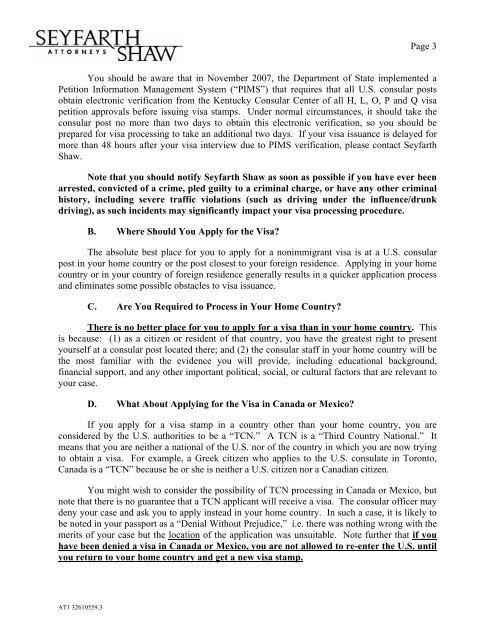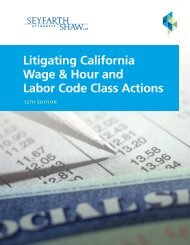Memorandum - Seyfarth Shaw LLP
Memorandum - Seyfarth Shaw LLP
Memorandum - Seyfarth Shaw LLP
Create successful ePaper yourself
Turn your PDF publications into a flip-book with our unique Google optimized e-Paper software.
Page 3<br />
You should be aware that in November 2007, the Department of State implemented a<br />
Petition Information Management System (“PIMS”) that requires that all U.S. consular posts<br />
obtain electronic verification from the Kentucky Consular Center of all H, L, O, P and Q visa<br />
petition approvals before issuing visa stamps. Under normal circumstances, it should take the<br />
consular post no more than two days to obtain this electronic verification, so you should be<br />
prepared for visa processing to take an additional two days. If your visa issuance is delayed for<br />
more than 48 hours after your visa interview due to PIMS verification, please contact <strong>Seyfarth</strong><br />
<strong>Shaw</strong>.<br />
Note that you should notify <strong>Seyfarth</strong> <strong>Shaw</strong> as soon as possible if you have ever been<br />
arrested, convicted of a crime, pled guilty to a criminal charge, or have any other criminal<br />
history, including severe traffic violations (such as driving under the influence/drunk<br />
driving), as such incidents may significantly impact your visa processing procedure.<br />
B. Where Should You Apply for the Visa?<br />
The absolute best place for you to apply for a nonimmigrant visa is at a U.S. consular<br />
post in your home country or the post closest to your foreign residence. Applying in your home<br />
country or in your country of foreign residence generally results in a quicker application process<br />
and eliminates some possible obstacles to visa issuance.<br />
C. Are You Required to Process in Your Home Country?<br />
There is no better place for you to apply for a visa than in your home country. This<br />
is because: (1) as a citizen or resident of that country, you have the greatest right to present<br />
yourself at a consular post located there; and (2) the consular staff in your home country will be<br />
the most familiar with the evidence you will provide, including educational background,<br />
financial support, and any other important political, social, or cultural factors that are relevant to<br />
your case.<br />
D. What About Applying for the Visa in Canada or Mexico?<br />
If you apply for a visa stamp in a country other than your home country, you are<br />
considered by the U.S. authorities to be a “TCN.” A TCN is a “Third Country National.” It<br />
means that you are neither a national of the U.S. nor of the country in which you are now trying<br />
to obtain a visa. For example, a Greek citizen who applies to the U.S. consulate in Toronto,<br />
Canada is a “TCN” because he or she is neither a U.S. citizen nor a Canadian citizen.<br />
You might wish to consider the possibility of TCN processing in Canada or Mexico, but<br />
note that there is no guarantee that a TCN applicant will receive a visa. The consular officer may<br />
deny your case and ask you to apply instead in your home country. In such a case, it is likely to<br />
be noted in your passport as a “Denial Without Prejudice,” i.e. there was nothing wrong with the<br />
merits of your case but the location of the application was unsuitable. Note further that if you<br />
have been denied a visa in Canada or Mexico, you are not allowed to re-enter the U.S. until<br />
you return to your home country and get a new visa stamp.<br />
AT1 32610559.3
















